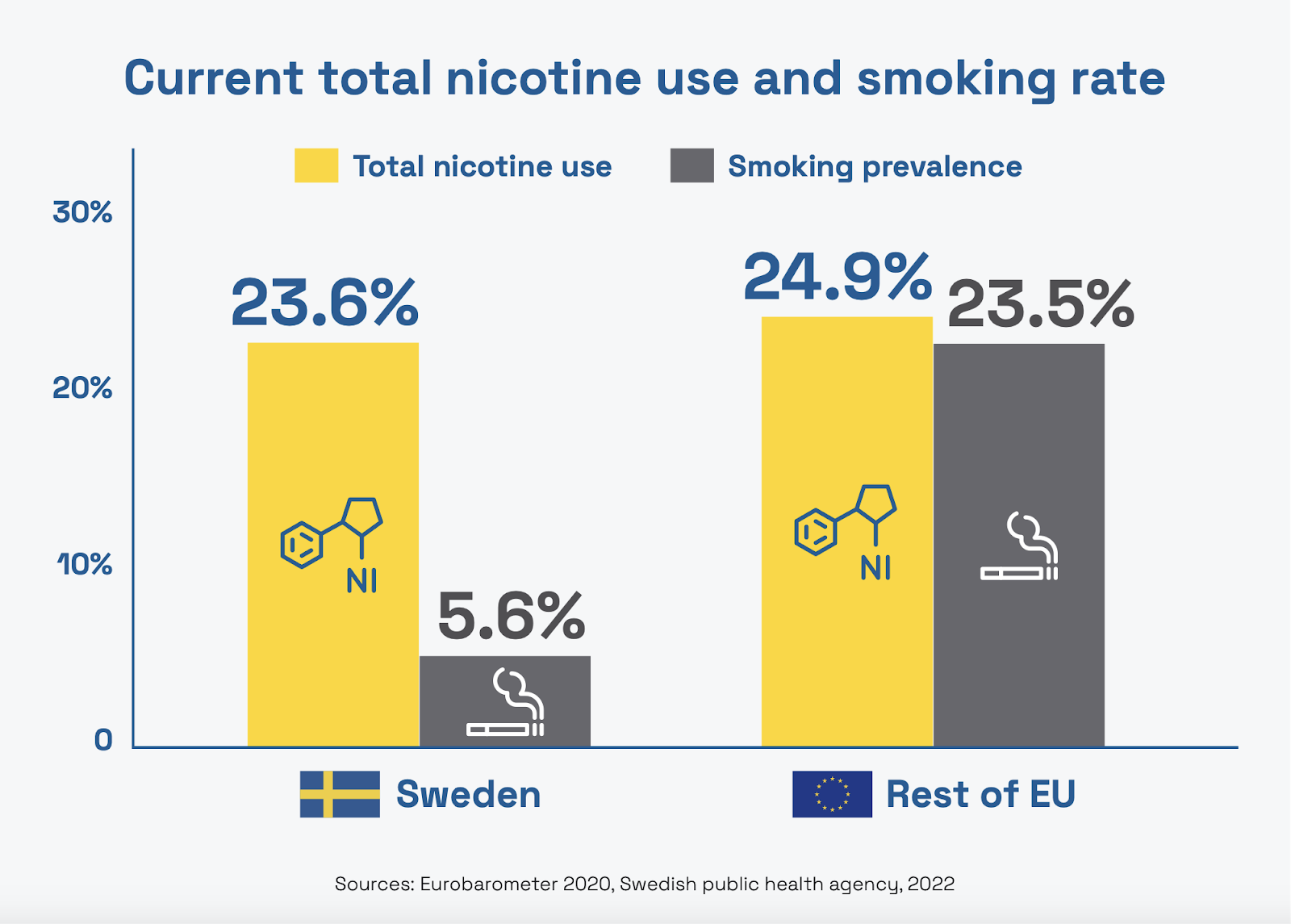A new landmark report – ‘No Smoke, Less Harm’ – proves that nicotine use does NOT lead to tobacco-related disease.
The study shows that Sweden has dramatically lower rates of tobacco-related deaths and health issues than other European nations – despite similar levels of nicotine intake.
In Sweden, one in four adults use nicotine daily, the same as across Europe. However, the Scandinavian country reports a massive 41 per cent lower incidence of lung cancer and fewer than HALF the tobacco-related deaths of 24 out of 26 of its European peers.
The positive impact of nicotine alternatives
This stark contrast is attributed to the widespread adoption of smoke-free nicotine products such as snus, nicotine pouches and vapes.
“This distinction between smoking and the use of smokeless products is crucial,” says Dr. Karl Fagerström, a public health expert and contributor to the report.
“While nicotine is addictive, it does not cause the serious diseases associated with smoking. Our findings support a shift in focus from cessation to substitution with less harmful alternatives for those unable to stop completely.”
Soon to be a ‘smoke-free’ nation
Sixty years ago, 49 per cent of Swedish men smoked cigarettes. By 2022, Sweden’s public health agency reported that only 5.6 per cent of Swedish adults continue to do so. Once this figure reaches five per cent, Sweden will officially be declared a ‘smoke-free’ nation by the World Health Organisation (WHO).
The new report, unveiled at an event this week by global health advocacy group Smoke Free Sweden, compares rates of nicotine usage and different tobacco-related diseases in Sweden against other countries. It finds categorically that nicotine use is NOT a factor in tobacco-related health issues.
“Despite widespread misperceptions, nicotine does not cause cancer and has minimal, if any, contribution to tobacco-related disease,” it says.
The report adds that “there will always be people who wish to consume nicotine, like those who consume caffeine” and enabling consumers to use nicotine in less risky ways will “save millions of lives.”
How nicotine is consumed is key
What does affect consumers’ health, the report says, is HOW nicotine is consumed. While using alternative products such as snus does not pose a significant risk, smoking is linked with a high incidence of death and disease.
Sweden’s proactive measures in public health education and regulatory frameworks have encouraged a transition to smokeless nicotine alternatives. This has significantly impacted its public health outcomes.
The report concludes that other nations could see similar dramatic reductions in the health impacts of tobacco if they embraced nicotine alternatives.
It says: “To this day, every year nearly eight million people die globally due to tobacco-related (largely combustion-related) diseases. This highlights a huge opportunity for public health, in terms of the numbers of lives that could be saved if smokers switched to less risky products.”
Learning from Sweden’s success story
Sweden’s early progress in cutting smoking rates was assisted by the traditional use of snus – a smoke-free oral tobacco product. The introduction of modern tobacco-free alternatives such as vaping in 2015 and next-generation oral nicotine pouches in 2018, accelerated this progress. Consequently, smoking rates in Sweden have plummeted by an impressive 55 per cent over the last decade.
Dr. Fagerström said: “The Swedish experience demonstrates that understanding and addressing public misperceptions about nicotine can lead to health policies that better protect and inform consumers.”
This report also serves as a call to the WHO and global public health communities to recognise that it is products of combustion that cause harm to smokers, and not nicotine itself.
The report demands that policymakers:
- Increase awareness and adoption of THR (tobacco harm reduction).
- Employ the “No Smoke, Less Harm” principle. This means differentiating between smoked and smoke-free products.
- Adopt a regulatory framework for nicotine alternatives that is relevant to their health risk.
- Act to eliminate disinformation about nicotine.
- Build more evidence about THR through research.



